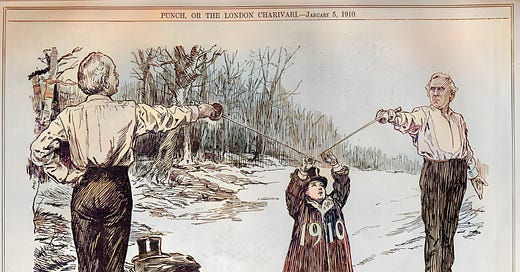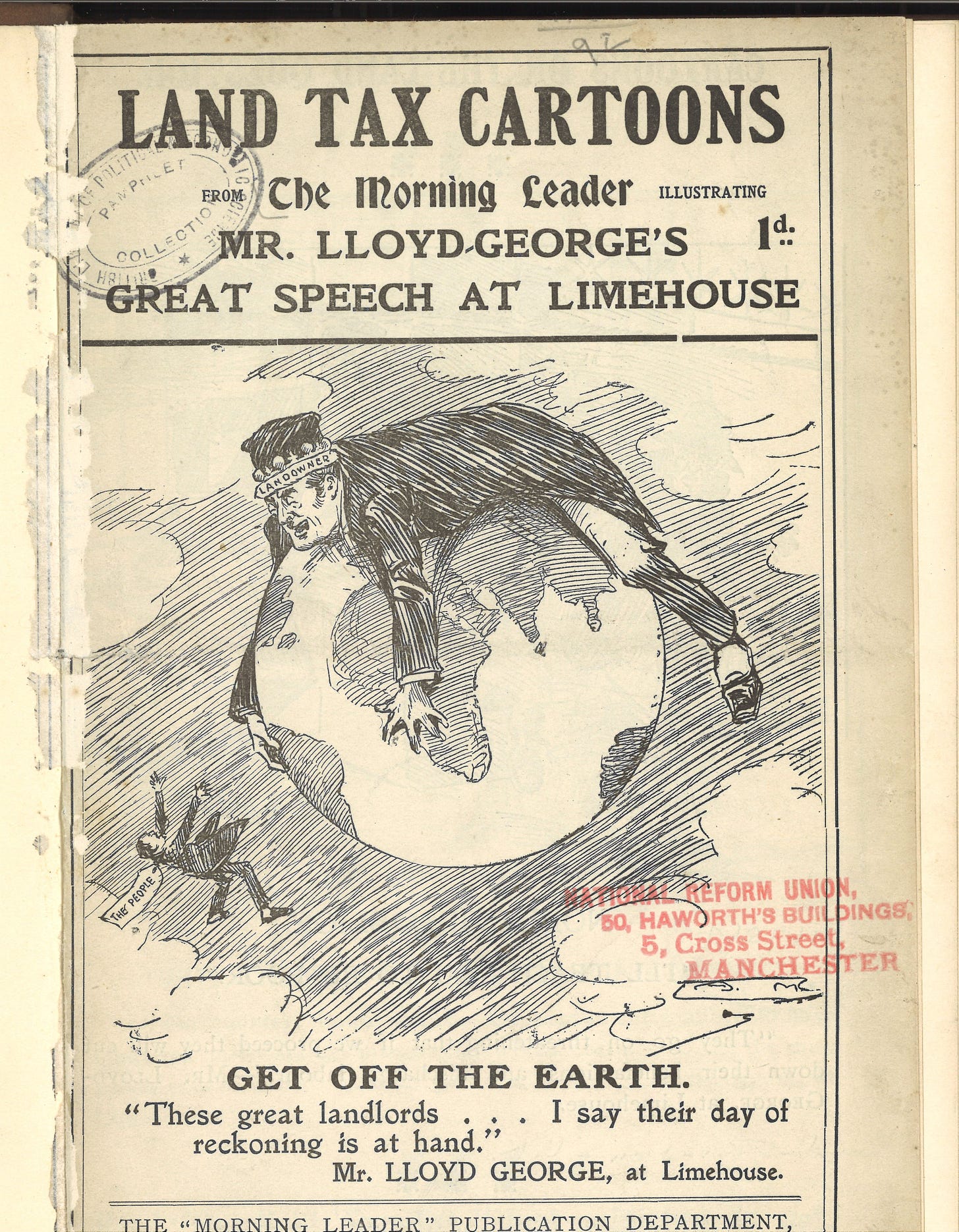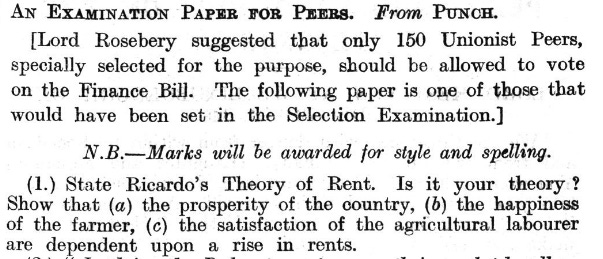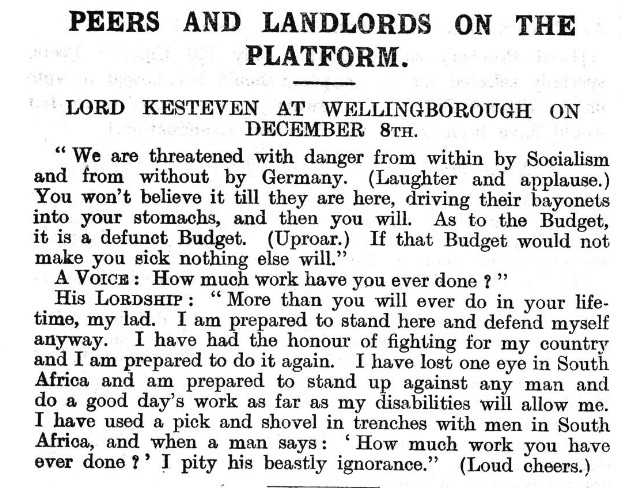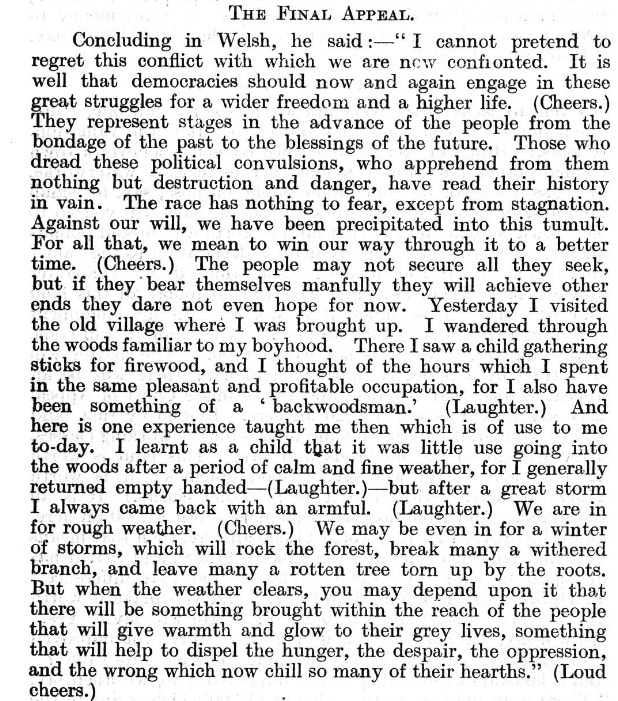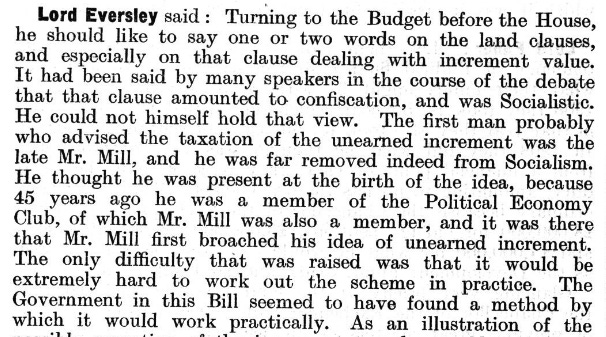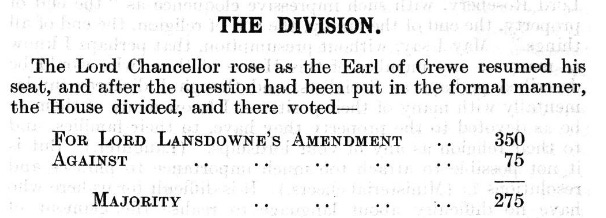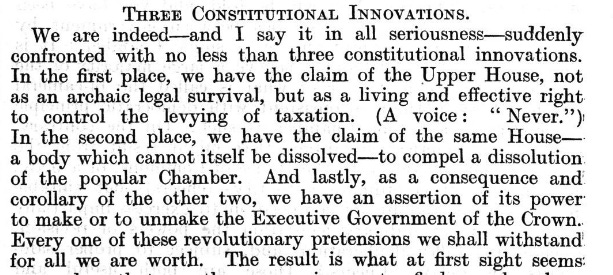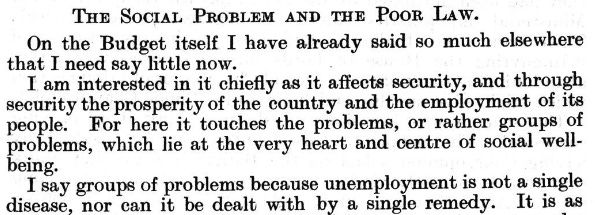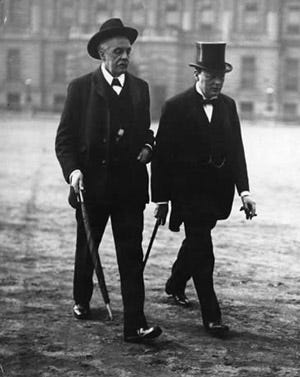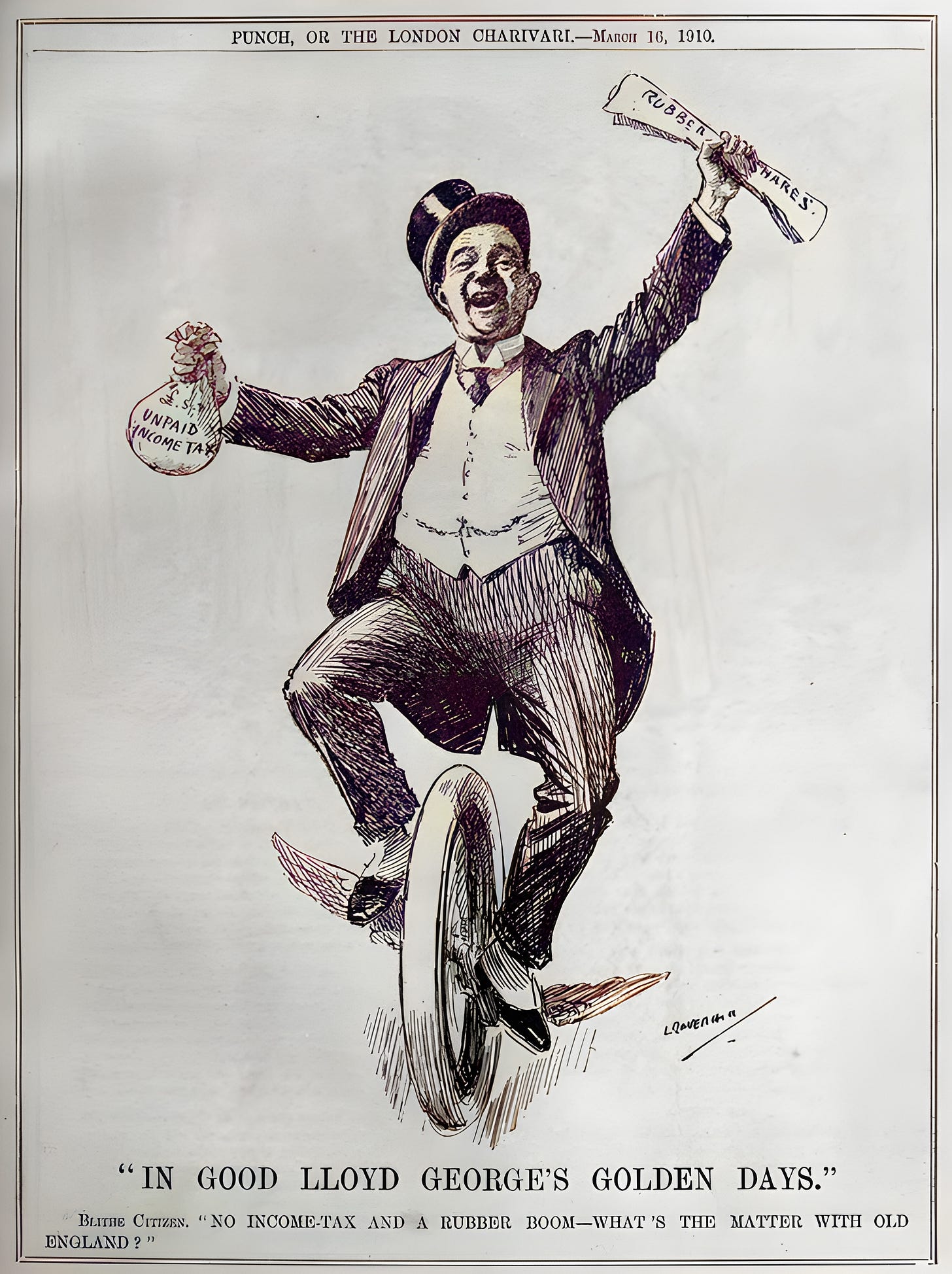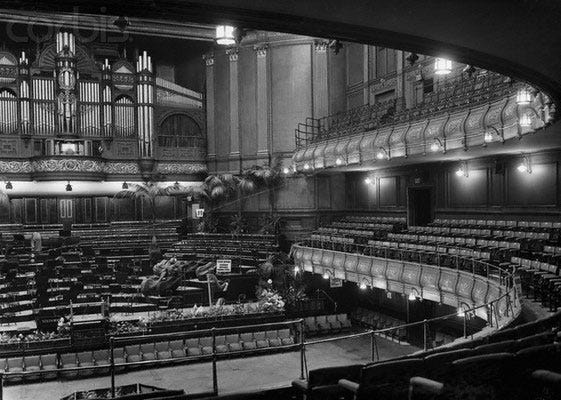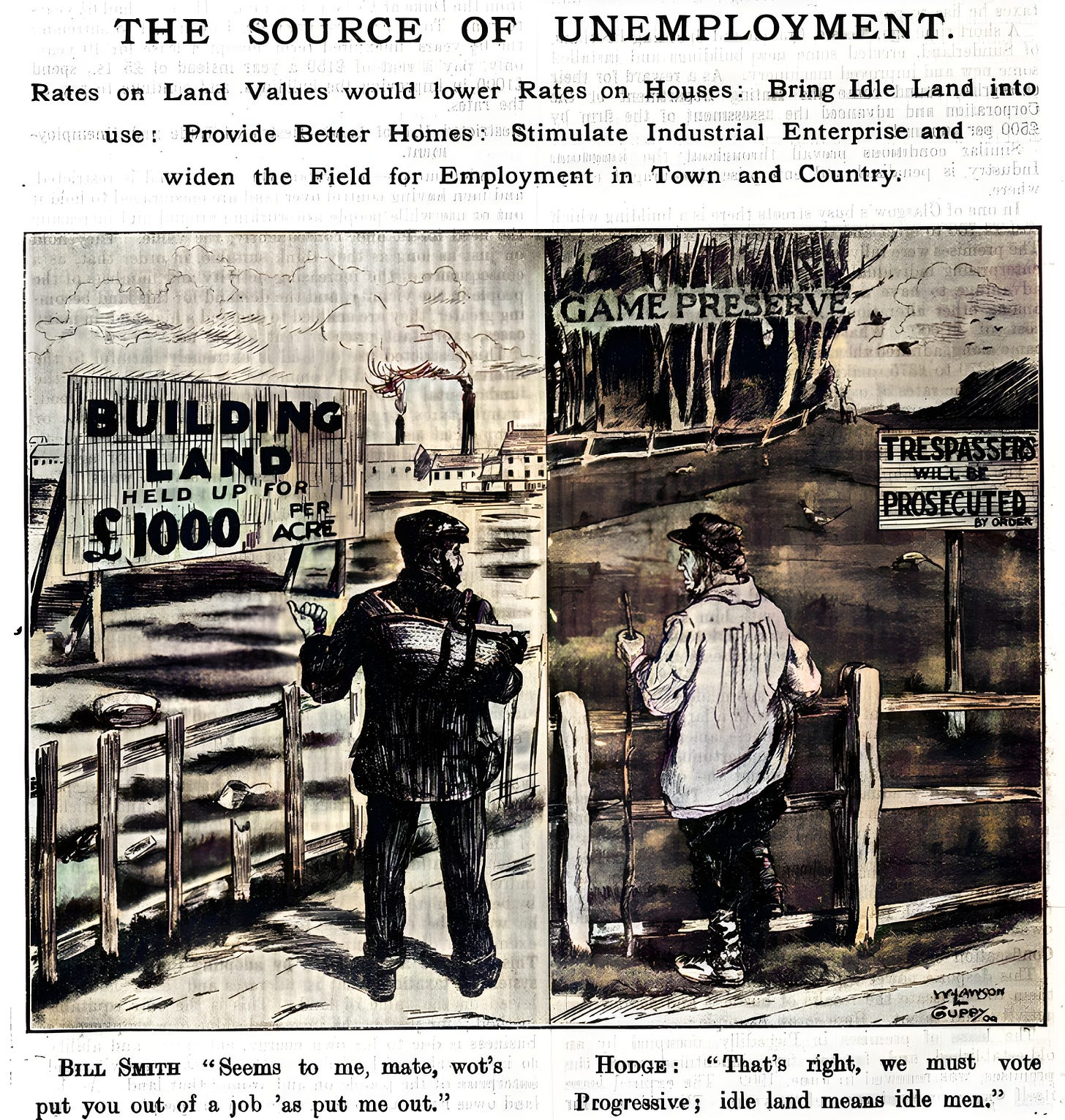The Single Tax v World War One (5) January-February 1910
“A dangerous game is now being played in England.”
“The Peers vs. the People”
“How did so many Unionists persuade themselves that they had the right to stage a coup d'état against the elected government?
We can start with the resolution by which the Lords voted down the 1909 budget:
'that this House is not justified in giving its assent to the Bill until it has been submitted to the judgment of the country'.
The Unionists were so angry that they were prepared to drop parliamentary sovereignty right at the start of the constitutional conflict.
From 1909 to 1914 they were confident that they, and not the elected government, represented the will of the people.”
- Iain McLean, The 1909 budget and the destruction of the unwritten constitution (2009)
War with Germany: “an unmistakable attempt in the strongholds of privilege to make a diversion”
“The war is on”: “they destroyed Parliament itself”
“the weight and force of centuries”
“They resist its dissolution as they resist death”
The valuation: “the most important step … in the history of any country”
Chicago - “there is a great historical lesson for Great Britain in her present historic hour”
Punch - agin it
bayonets
“We say the country has need of money and we are looking out for somebody to tax. (Laughter)”
“I tell you what they object to. It is the valuation. (Cheers)”
“Where is the Socialism, injustice, and wrong? Where is the oppression?”
“democracies should now and again engage in these great struggles for a wider freedom and a higher life.”
Lord Curzon: “All civilisation has been the work of aristocracies”
American manufacturer and philanthropist Joseph Fels was a leader of the Single Tax movement. He was particularly active promoting the cause internationally.
“The passage of the Budget in England means that the land question will have to be taken up in the United States.”
U.S. - “You have no idea of the deep and general interest that has been taken in your Budget”
Germany: “a dangerous game is now being played in England.”
“men might be placed at the helm who might wish, for personal reasons, to provoke a war with Germany.”
The People’s Law
House of Lords, November 1909: the Budget’s rejection.
The new taxes “single out for specially severe treatment a class that does not deserve it.”
“based on a Socialistic fallacy”
The Lord Chancellor Robert Reid:
“They are in this country novel and experimental taxes. But the principle of this taxation is not new in the Colonies.”
The Earl of Cromer:
“… to pave the way for the introduction of profound changes of a Socialistic character”
The Earl of Lytton:
“… to pave the way to the nationalisation of the land.”
Joseph Chamberlain and Single Tax principles: very much opposed now, but very much in favour of in 1886:
“I think that the time has come when this form of ransom should cease. … it should no longer be considered one of the rights of property to go on blackmailing the public”
“so unusual in its conception, so startling in possibilities”
The heart of the debate
Balfour: “We are asked, for the first time, to look at the origin of property.”
The unearned increment: theory and practice
Lord Denman: “would like to see Mr. Winston Churchill and Mr. Lloyd George in the middle of 20 couples of dog-hounds”
“the end of property, the end of the family, the end of religion, the end of all things.”
The Lords reject the Budget.
The Prime Minister on the Lords’ slide towards revolution:
“Every one of these revolutionary pretensions we shall withstand for all we are worth.”
Asquith: the Lord’s constitutional counter-revolution was caused by the Single Tax movement:
Joseph Chamberlain
“uncontrolled master”
“the culmination of a long-drawn conspiracy”
“unemployment is not a single disease, nor can it be dealt with by a single remedy”
“on the subject of land no absurdity in argument and no folly in legislation seems wholly ruled out”
“The earth is the Lord’s and therefore, in a well constituted society the rents should go to the Chancellor of the Exchequer.”
Churchill, Lloyd George: “the opening of a new era in the history of our country.”
“Naturally such a man greatly influenced me. When I crossed the floor of the House and left the Conservative Party in 1904, it was by his side I took my seat.”
- Winston Churchill, speaking of Lloyd George.
“Churchill had become a Liberal. More precisely, he was a Lloyd George Liberal.”
- Robert Lloyd George, David and Winston, How a Friendship Changed History (2005)
“the Tories are fighting against the Budget for the sole reason that it introduces the principle of the Single Tax”
Balfour and Churchill
Balfour: “a scholarly man who was struggling to make out a case that he did not believe in”
Lloyd George’s election campaign #1
THE GREAT ASSIZE OF THE PEOPLE
NATIONAL LIBERAL CLUB, December 3, 1909.
From Better Times, Speeches by the right hon. D. Lloyd George, M.P. Chancellor of the Exchequer (1910).
its slaughter has raised greater, graver, and more fruitful issues.
I am here neither to bury nor to praise the Budget. If it is buried, it is in the sure and certain hope of a glorious resurrection. As to its merits, no one appreciates them more sincerely than I do; but its slaughter has raised greater, graver, and more fruitful issues.
the sinister assembly
The momentous event of last Tuesday has closed one chapter in the history of this country … the sinister assembly which is more responsible than any other power for wrecking popular hopes has, in my judgment, perpetrated its last act of destructive fury.
haunting terrors
And yet here you have an order of men blessed with every fortune which Providence can bestow on them grudging a small pittance out of their super-abundance in order to protect those who have built up their wealth against the haunting terrors of misery and despair.
one of the greatest, gravest, and most promising struggles of the time
They have thrown out the Budget, and, in doing so, have initiated one of the greatest, gravest, and most promising struggles of the time. Liberty owes as much to the fool-hardiness of its foes as it does to the sapience and wisdom of its friends.
At last the cause between the Peers and the people has been set down for trial in the great assize of the people, and the verdict will soon come. The Assembly which has delayed, denied, and mutilated justice for so long has at last been brought to justice. Well, now, we are on the eve of a General Election, which will decide this great question.
taxing the unearned increment upon land
The Tory Party, hard pressed, has always resorted to Protection. They will try it again. It will fail. It is not that we are afraid of them. In fact, it raises in a very clear way the issue which we will be delighted to get the mind of the country upon : whether the service of the country, whether the money for the service of the country is to be raised by taxing the unearned increment upon land and by taxing luxuries, or by taxing the bread and meat of the people.
Here are you, a nation of nearly 45 millions, one of the greatest nations the world has ever seen, a nation whose proficiency in the art of government is unrivalled, a nation which has no superior in commerce or in industry. It has established the greatest merchant fleets that ever rode the waves. It has got the greatest international commerce in the world. It has founded the greatest and most extensive empire the world has ever witnessed.
Who are the guardians of this mighty people?
And yet we are told that this great nation, with such a record of splendid achievements in the past and in the present, is unfit to make its own laws, is unfit to control its own finance, and that it is to be placed as if it were a nation of children or lunatics, under the tutelage and guardianship of some other body—and what body? Who are the guardians of this mighty people? Who are they? … They are men who have neither the training, the qualifications, nor the experience which would fit them for such a gigantic task.
shackled and tethered by monopolies and privileges
This is a great issue. It is this : Is this nation to be a free nation and to become a freer one, or is it for all time to be shackled and tethered by tariffs and trusts and monopolies and privileges? That is the issue, and no Liberal will shirk it. It is time something were done. The insolence of that Assembly has grown by immunity. They did not believe we were in earnest, and it is time that we showed that we were.
Here you have got two assemblies face to face, and one of them must prevail
I should like to examine the claim of this House of Lords to be the impartial, superior, judicial, and dispassionate assembly which its own friends assume that it is. It is a great claim. Let us examine its credentials. Here you have got two assemblies face to face, and one of them must prevail. Let there be no mistake about that. It is not a question whether the House of Commons and the House of Lords on side by side with almost co-ordinate authority; it is a question which of them is to prevail. Is it the House that represents the 45,000,000 of people, or the House that represents the 600 more or less who happen to be there at the time, and I am not sure that it represents even them?
Lord Rosebery-nobody will accuse him of excessive partiality either to the Budget or the Government, and if he advised them not to throw it out it must have been after à careful consideration of all the conditions. He was of opinion that it was a mad act of folly.
Being in the trap, he thought he might as well eat the cheese
Who was on the other side ? Lord Lansdowne. … He has been forced into his position. It is not I that said so. Lord Rosebery said so. Others sitting on the same side hinted it broadly. He was forced into it against his own better judgment, but, having been forced, saw no way out of it. Being in the trap, he thought he might as well eat the cheese, and not leave it for the consumption of any other mouse or rat.
But who is really on the other side? Lord Curzon unmistakably. There was no mistake about him. Now, Lord Curzon is not a very wise or tactful person.. All I would say about him would be this: I think he is less dangerous as a ruler of the House of Lords than as a ruler of India. For further particulars apply to Lord Kitchener.
“Damn the consequences !”
Look at the two pro-consuls who took part in this debate—one of them, Lord Cromer, advising that the Bill should not be thrown out; the other, Lord Milner, advising that it should be thrown out; Lord Cromer, the man who, finding a province devastated by its Government, desolated by war, left it a land of abounding and smiling prosperity; the other found a smiling land-prosperous, leaping into great wealth-and left it, after two years of mis-management and miscalculation a scorched and blackened desert. He has a peculiar genius for running institutions and countries into destructive courses. There is the man who threw out the Budget ! His motto is one I apologise for quoting in a respectable assembly. His motto is “Damn the consequences.” The war, he says, will only cost ten millions. Somebody says it will cost 220 millions. He says “Damn the consequences !” Tariff Reform, says he, will produce 20 millions a year and help every trade and industry. You go to him and say it won't produce five, and will ruin and embarrass half the trades of the land. He will say “Damn the consequences !”
Why, they cannot put out a little fire in the backyard of the Sunday edition of the Daily Mail.
That is how the Bill was thrown out—not by the wise men, not by the reflecting men, of the Unionist Party, but by its Mad Mullahs. And here is the assembly-you see what I am coming to? —here is the assembly which is supposed to be dispassionate, to be calm, to be judicial above everything—this is the body that is to stand between us and anarchy! Here is the Fire Brigade that is to quench the flames of revolution when they come ! Why, they cannot put out a little fire in the backyard of the Sunday edition of the Daily Mail. They have joined the incendiaries.
That right is the proud possession of Englishmen
Here we are this afternoon, at a public meeting, discussing urgent matters of vital public importance, and think nothing of it—nothing of it! But you know that this commonplace right has cost centuries of strife, of suffering, of struggling to our forefathers. And the rights of the Commons of England to grant supplies and to make the redress of grievances the condition of that grant drenched England with blood. That right is the proud possession of Englishmen. They were pre-eminent in the conflict that won it. It is their noblest tradition, and I do not believe that the dauntless national spirit which won that liberty has become so degenerate that at the call of an effete oligarchy, without striking a blow, Englishmen of to-day mean to surrender one of the finest and fairest provinces of freedom won by their ancestors.
Lloyd George’s election campaign #2
THE BUDGET EXAMINED
CARNARVON, December 9, 1909.
the gravest political crisis that has arisen in either your day or mine
We are here to consider the gravest political crisis that has arisen in either your day or mine. It is not due to one event, but to a series of events. For the first time in the history of this country a financial provision made by the Commons of this country for the services of the land has been rejected by the House of Lords.
This is making a mockery of the democracy. It is making progress impossible. The Lords will succeed in accomplishing their object unless we put an end once and for all to their mischievous work. The Liberals have shown unutterable patience for years. This is the time for us to strike, and we have done it.
They have thrown out the Finance Bill. It is a most serious act, I think, on the part of the House of Lords, to dislocate the finances of the year. They have done it because they say that this is an unprecedented Bill. ... They said: “This is so revolutionary, this is so drastic, and, above all, it is so Socialistic."
We now come to the land taxes. What are the proposals of these taxes? The first is this, that the owners of land should pay on its full real value. … And you must remember this, that the value of land in the neighbourhood of a town has been created by the industrial growth and energies and efforts of the inhabitants of the town themselves.
What is the second principle of the land taxes? It is that when land grows in value, not owing to any expenditure by its owner, to any capital invested by him, to any improvements effected by him, but purely to the growth of the community around, then one-fifth of the increased value shall go to the pockets of the community that created the whole of it.
What is the third tax? We have in this part of the country the leasehold system, which is a truly vicious system. What happens when a man takes a piece of land to build upon it? A man builds upon it, and the rent immediately goes up by leaps and bounds to as much as four, five, ten, and fifty times, and sometimes—I can give you cases—a hundred times the previous value of the land, solely because he has built a home for himself upon it.
what shall we tax? We will tax the man who is getting something that he never earned
We do not want to tax industry, we do not want to tax enterprise, we do not want to tax commerce—what shall we tax? We will tax the man who is getting something that he never earned, that he never produced, and that by no law of justice and fairness ought ever to belong to him.
Lloyd George’s election campaign #3
THE PEERS AND PUBLIC OPINION
WALWORTH, December 17, 1909.
Tax cats!
I tell you when I was making the Budget I inquired into everything, and I had all sorts of suggestions. Why, one day I received a postcard :- “I had two cats on my window-sill last night; there were three in the back-garden. They kept me awake all night. Tax cats !" That writer evidently believed in a vindictive Budget.
Lord Lansdowne's answer is—“Don't tax the landlords; tax the kiddies !-tax anything but land !
We have found them out in time
We have found them out in time. What they wanted were “the good old days,” that the rich might be made richer, that the fat rent rolls might become fatter. But the bare cupboard of the poor would become barer. It is the spirit of reaction, the spirit which takes you back sixty years to the days of the Corn Laws, a spirit that would take you still further back to the days when the Commons were still struggling for the right to grant supplies to secure redress; still further back to the days when the barons ruled the land.
Our policy is the policy of forward progress
Our policy is the policy of forward progress. They say, Let us go back. Never! The Budget found them out, found them out in time to stop the conspiracy. And now they are worrying about their land, and they are anxious about their privileges. They are unhappy about their general position. And I am glad to see anxieties for once flitting from the cottage to the castle. It is a good omen.
Lloyd George spoke at Queen’s Hall, London on 31 December, on THE PROBLEM OF UNEMPLOYMENT, and its relation to the land clauses - it is featured further below.
Lloyd George’s election campaign #4
THE BUDGET AND SOCIAL WELFARE
READING, January 1, 1910.
north, south, east, and west
I READ to-day in one of the obituary notices of the Old Year which appears in one of the Tory papers, that the Budget is dead. By this large, enthusiastic, and I may say electric meeting, it does not look like it. I have been travelling during the last few weeks in the north, south, east, and west, and I find there's the same determination on the part of the people to win.
Why is your member forced to come down at this season of the year to fight a contested election? Why has the Government in its good work not been allowed to run its natural and usual course?
Why? The reason is that the rich land-lords who are represented specially in one branch of the Legislature decline to bear their fair share of the burden of taxation of this country. They have a special branch of the Legislature to protect their rights and privileges. What was the expenditure towards which they were called upon to pay their fair share and nothing but their fair share? It was an expenditure that they themselves and their associates had taken a prominent part in forcing upon the country. They were quite willing to agitate even for Old Age Pensions when they wanted their party returned to power in 1906. And during last year they were clamouring for a bigger and a more expensive fleet. There was a great national crisis, we were told; the security of our shores was threatened; the Germans might come over any day.
“We want eight, and won't wait.”
I was telling you about these gentlemen who ordered Dreadnoughts and won't pay for them. I remember just about the time that agitation was on I found painted on the pavement of Downing-street, “We want eight, and we won't wait.” The paint worn off by the feet of people tramping along Downing-street has not been renewed recently, now that it is necessary to find means of paying the money. Meetings were organised all over the country. Those meetings were dropped, or rather converted into meetings to protest against payment. They won't pay; they flung the Bill out of the House of Lords and said, “If you want payment, you pawn the workman's loaf.” We say “Never. We would rather get rid of you, my lords.” They say “Your Budget is unfair; it places burdens which are too heavy on the poor rich men of the country. Tax bread, tax meat.'
After all the Budget raises money not merely for Dreadnoughts but for social reform. I agree we must make our shores absolutely secure against the possibility of foreign invasion. We have been immune for so many centuries. It has been an undoubted advantage to us-that immunity. It has enabled us to pursue our own way, do our own work in peace. Peace is such a blessing ! Peace is such a treasure that it is undoubtedly worth spending money to make it absolutely secure, and you may depend upon it this Ministry will not shirk its duty in that respect. But we must also make not merely our shores secure. We must make our homes secure. What does the Budget do? What is the really great root trouble of our present social system?
above all, we must deal with the land problem
We can't settle the unemployed problem without making a real great concerted national effort, and, above all, we must deal with the land problem, and if we do that, if we get a free hand unfettered by this sinister power that has wrecked every progressive scheme in the past, then we can do things. This is the first day of a new year; not a new year, but the beginning of a new era. This year, for better or for worse, is going to leave an indelible mark on the history of this great land. What it brings forth for the people depends on the people themselves.
the cauldron which never boils soup except for brave men
Amongst the legends of my native land there is one that always strikes me as full of meaning and instruction. It is a legend of the cauldron which never boils soup except for brave men. The political cause of 1910 is of that character. What will become of this conflict depends entirely upon the courage, the firmness, the determination, which the people display. If they fail, then this year will be looked back upon with a shudder as a year in which the people sold their birthright-won for them by the blood and sufferings of their ancestors—to the selfish aristocracy; as a year in which they pulled down the flag of freedom which has waved for 60 years over their market places and exchanges, and threw it at the feet of the plutocracy. That is how it will be remembered if we fail. But if we respond to the call at this great hour then 1910 will be looked back upon with pride as a great year when the people won complete self-government in their own land, when they established their right to govern in their own country, when they established security in their homes, and shattered the feudal chains and threw off the feudal burdens. a word, this truly will be the year of grace—1910.
“I saw one of the most beautiful skies… if you looked towards the west there was a solid bank of gold”
Further quotes:
THE PROBLEM OF UNEMPLOYMENT
D. Lloyd George, Queen’s Hall, 31 December 1909
This highly significant speech is not widely quoted, even in Georgist circles. These extracts were transcribed from Better Times, Speeches by the right hon. D. Lloyd George, M.P. Chancellor of the Exchequer (1910).
“This great gathering has been summoned together to appeal to the greatest metropolis in the world, of the greatest Empire in the world, to take its place in the forefront of the great struggle for the rights of the people.
What is the Tory answer? I have followed it very closely, and, as far as I can see, in London they attempt no answer at all, but they seek to divert attention by side issues.
[Why the Lords had rejected the Budget:]
The first reason undoubtedly was this - that in the course of the next twelve months, before they would get any oportunity of calling upon the country to express their opinion on the Budget, great progress would have been made with the land valuation.
Now, I want you to consider what that would have revealed.
It would have revealed startling results. It would have shown, at any rate, the extent to which the great ground landlords of the country have escaped their fair share of the burden of taxation. …
By throwing out the Bill the Lords for the time being have avoided that catastrophe, and naturally they are anxious.
You can frighten the people about Halley’s Comet.
You can tell them what a frightful catastrophe will happen when we pass through its tail. But once we are through, all the dangers are over, and you will know really how thin it is.
Well, now, you may mitigate the evils of unemployment, I agree. I believe eventually you may be able to remove them, but not by this method.
We have the biggest trade in the world - I challenge anyone to contradict it - in shipping and manufactures. We are not mere carters. We are not mere parcel deliverers. We make goods. We make the best goods. Manufactures, fabrics, textiles - we make the best, and we sell at a good price, too, everywhere.
We shall see in a year, a year which will be a very fateful one in the history of the democracy of this country, but one which, I hope, will mark the dawn of a new era.
But is that all that Liberalism has to say about unemployment, you will ask? No. If that were the only nswer Liberalism had to make about unemployment, well, I tell you frankly, I should not be here as a Liberal Minister to-night.
Our only hope of effecting a permanent improvement in the problem of the unemployed is in a complete overhauling of our land system. And now we come to business.
The first essential condition in the fully developing the resources of this country is to give absolute security to the man who spends money upon developing.
Our idea as to land is fundamentally wrong, and I will tell you why. … How does that affect the problem of unemployment?
I will tell you. … Why is it you get two men running after one job? It is because there is a flood of people who have been flowing steadily from the villages and rural districts into the towns to find work that they ought to have found at home.
I say this, the land of England was not made for the partidges, but for the peasants of England. Every other country in the world is paying attention to this.
There is no land under the sun that repays capital more than the land of England. It is the richest under the sun. That is why the Saxons took it away from us, and left us the hills.
What would happen if you had a rational land system?
The people would flock to the land exactly as they haver been flocking to seek a job anywhere in the great commercial and industrial centres. The people prefer the land in every country. A man will take less for labouring on the soil, and he is right. He gets something from the land that no gold can ever pay for him.
I was passing, the other day, on my way to one of my boroughs, when I saw one of the most beautiful skies.
The whole firmament of heaven was lines with a fine white wool, and if you looked towards the west there was a solid bank of gold of the richest hue, and you might have imagined that at the first shower the whole country would have been covered with enough wool to clothe the inhabitants for the rest of their time and enough gold to keep us above want for the rest of our days.
Let us rather get back to the free, unfettered, unshackled cultivation of the land of England.
The land makes no promise to the tiller it does not fulfil; it excites no hopes in the springtime that it does not realise at harvest. The land is the bountiful mother that gives to the children of men sustenance, security, and rest.”
- David Lloyd George, The problem of unemployment, Queen’s Hall, London, December 31, 1909, from Better Times, Speeches by the right hon. D. Lloyd George (1910)

